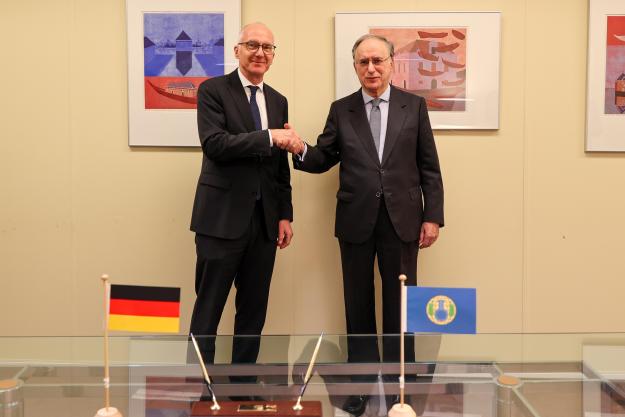The Federal Republic of Germany has made a voluntary contribution of €500,000 to the Organisation for the Prohibition of Chemical Weapons (OPCW) to support activities in relation to Ukraine.
The contribution is to be paid into the Trust Fund for the Implementation of Article X, for the Ukraine Assistance and Protection programme, which will include training of Ukrainian first responders and CBRN-experts.
The contribution was formalised on 3 December 2024 in a signing ceremony held between the Ambassador, Permanent Representative of Germany to the OPCW, H.E. Mr Thomas Schieb, and the OPCW Director-General, Ambassador Fernando Arias, at the OPCW's Headquarters in The Hague.
Ambassador Schieb thanked the Director-General for the professionalism of the Technical Secretariat of the OPCW in providing technical assistance to Ukraine, referring in particular to the three Technical Assistance Visits (TAV) conducted in the period between June and November 2024. He said: "Germany was pleased to donate another half a million Euro to enable the Technical Secretariat, under Article X of the Chemical Weapons Convention (CWC), to continue improving Ukraine's ability to protect its people against the use of chemical weapons as well as to investigate the nature and scale of breaches of the CWC."

H.E. Mr. Thomas Schieb, Permanent Representative of Germany to the OPCW, and Ambassador Fernando Arias, Director-General of the OPCW
Director-General Arias stated: "I express my sincere appreciation to Germany for its strong support to the OPCW's activities and missions. This contribution demonstrates Germany's steadfast commitment to advance the goals of the CWC, and will reinforce the Organisation's ongoing work in relation to Ukraine. It is important for all States Parties to firmly uphold the norm against chemical weapons. The Technical Secretariat stands ready to continue assisting them through independent expertise."
Background
The Federal Republic of Germany is currently represented in the OPCW Executive Council, the Advisory Body on Administrative and Financial Matters, the Confidentiality Commission, the Scientific Advisory Board, and the Advisory Board on Education and Outreach.
To date, Germany has contributed more than €13 million to eight OPCW trust funds, including the Trust Fund for the Centre for Chemistry and Technology (ChemTech Centre) Trust Fund for Syria Missions and the Trust Fund for the Implementation of Article X.
Article X of the Chemical Weapons Convention provides for assistance and protection to a State Party if it is attacked or threatened with attack by chemical weapons.
The OPCW Technical Secretariat has been monitoring the situation on the territory of Ukraine since the start of the war in February 2022 in relation to allegations of use of toxic chemicals as weapons. On 18 November 2024, OPCW issued report on its Technical Assistance Visit (TAV) to Ukraine following an alleged incident of use of toxic chemicals as a weapon. The report confirmed presence of the toxic chemical 2-Chlorobenzylidenemalononitrile, known as CS, related to an alleged incident that took place along confrontation lines in Dnipropetrovsk region on 20 September 2024.
As the implementing body for the Chemical Weapons Convention, the OPCW, with its 193 Member States, oversees the global endeavour to permanently eliminate chemical weapons. Since the Convention's entry into force in 1997, it is the most successful disarmament treaty eliminating an entire class of weapons of mass destruction.
In July 2023, the OPCW verified that all chemical weapons stockpiles declared by the 193 States Parties to the Chemical Weapons Convention since 1997 - totalling 72,304 metric tonnes of chemical agents - have been irreversibly destroyed under the OPCW's strict verification regime.
For its extensive efforts in eliminating chemical weapons, the OPCW received the 2013 Nobel Peace Prize.






